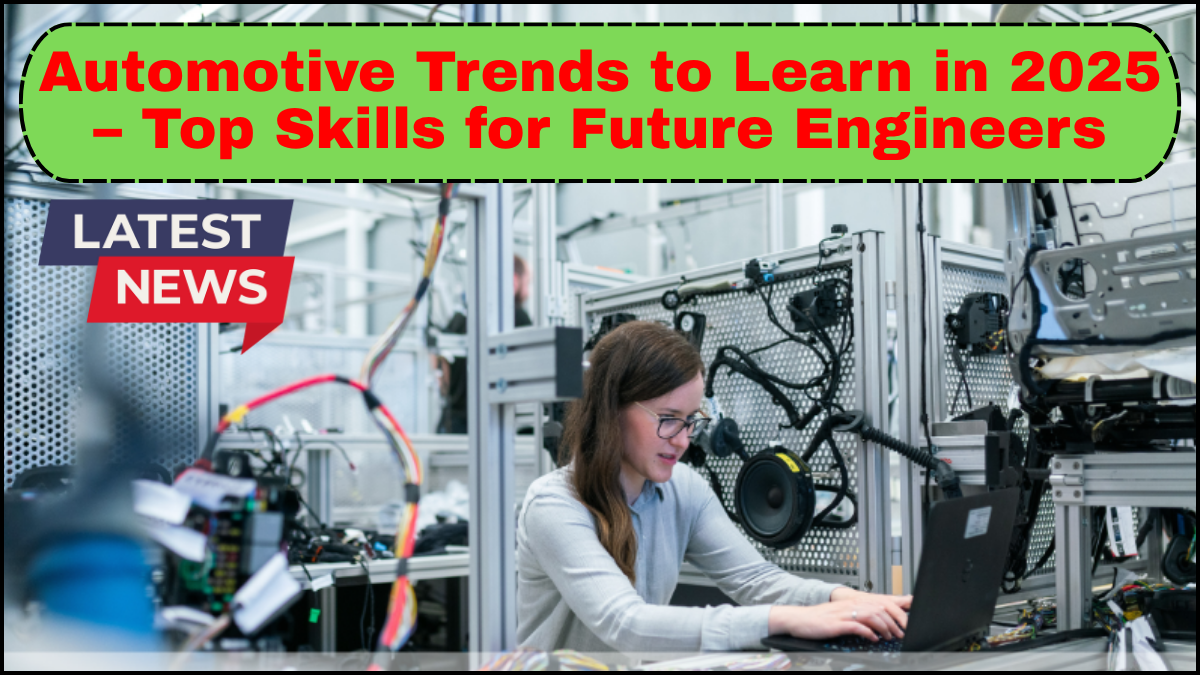As we enter a transformative era for the automotive industry, engineers must stay ahead of emerging technologies and evolving consumer demands. Automotive engineering trends in 2025 are reshaping how vehicles are designed, powered, and integrated into the broader tech ecosystem. From AI-driven automation to sustainable materials, future engineers must sharpen a new set of skills to stay competitive and relevant.

Below are the most impactful trends and the 2025 skills every aspiring automotive engineer needs to master.
Electrification and Battery Innovation
Electric vehicles (EVs) are no longer a fringe trend—they’re becoming the standard. By 2025, global EV adoption will accelerate, driven by stricter emissions regulations and consumer demand for sustainable mobility. Engineers must understand:
-
Battery technologies such as solid-state batteries, which offer faster charging and higher energy density.
-
Thermal management systems to ensure optimal battery performance and safety.
-
Power electronics and drivetrain integration, essential for efficient energy use.
Why it matters: Engineers with deep knowledge of battery architecture and energy storage solutions will be critical in designing next-generation EVs that are safer, more efficient, and affordable.
Autonomous Vehicle Technologies
Autonomous driving isn’t just a buzzword—it’s a foundational shift in transportation. Companies like Tesla, Waymo, and Apple are investing heavily in autonomous systems, and future engineers need to be fluent in:
-
Sensor fusion (LiDAR, radar, cameras)
-
Real-time decision-making algorithms
-
Embedded systems and edge computing
-
ISO 26262 functional safety standards
2025 skills in AI, computer vision, and control systems will be essential to building safe, scalable autonomous platforms.
Vehicle-to-Everything (V2X) Communication
As cars become smarter, their ability to communicate with infrastructure, pedestrians, and other vehicles will be vital. V2X is expected to reduce traffic congestion, enhance safety, and improve fuel efficiency.
Engineers need a grasp on:
-
5G and edge computing integration
-
Cybersecurity for connected vehicles
-
Standardized communication protocols (DSRC, C-V2X)
Being equipped to develop or secure these communication systems is a must-have skill in 2025.
Software-Defined Vehicles (SDVs)
Gone are the days when a car’s features were locked in at production. Software-defined vehicles allow for over-the-air (OTA) updates, enabling automakers to fix bugs, add new features, or even monetize subscriptions post-sale.
Engineers must be skilled in:
-
Software architecture and modular design
-
Embedded Linux and real-time operating systems (RTOS)
-
Automotive-grade cybersecurity frameworks
As vehicles become more digital than mechanical, engineers who can code will have the upper hand.
Sustainable Materials and Green Manufacturing
Sustainability isn’t limited to the fuel source. Future automotive engineers must contribute to reducing the industry’s environmental impact through:
-
Recyclable and lightweight materials
-
Eco-friendly manufacturing processes
-
Lifecycle assessments (LCA) and carbon tracking tools
Brands like BMW and Ford are already using recycled plastics, ocean waste, and even mushroom-based foam in their interiors. Knowing how to source, test, and implement green materials will be a key differentiator.
Data-Driven Engineering and Predictive Analytics
Data is transforming automotive R&D. From predictive maintenance to AI-based quality control, engineers must know how to gather, interpret, and act on data.
Top skills include:
-
Machine learning for system optimization
-
Big data analytics for customer insights
-
Digital twins for real-time performance simulation
In 2025, decisions made without data will simply be obsolete.
Multi-Disciplinary Collaboration and Agile Development
The complexity of modern vehicles demands cross-functional collaboration. Engineers must be agile, not just technically, but in how they work with teams across disciplines like UX design, cybersecurity, and AI.
Familiarity with:
-
Agile product development cycles
-
Collaborative platforms like JIRA or Git
-
Cross-domain systems thinking
…will define your ability to lead in tomorrow’s automotive projects.
FAQs
What are the top automotive engineering trends to follow in 2025?
The most significant trends include electric vehicle innovation, autonomous driving, V2X communication, software-defined vehicles, sustainable manufacturing, and AI-powered analytics.
Which 2025 skills are essential for automotive engineers?
Critical skills include knowledge of battery systems, software development, AI and machine learning, cybersecurity, V2X technologies, sustainable design, and agile methodologies.
Is software development important in automotive engineering?
Absolutely. With the rise of software-defined vehicles, engineers must be proficient in programming, embedded systems, and cybersecurity to remain competitive.
How will AI affect automotive engineering careers?
AI will reshape automotive design, manufacturing, diagnostics, and autonomous systems. Engineers with AI expertise will be in high demand for roles involving system optimization, predictive maintenance, and autonomous control.
Why is sustainability important in automotive engineering?
Sustainability is now a core business priority. Engineers must contribute by designing energy-efficient vehicles, using recyclable materials, and minimizing carbon emissions throughout the product lifecycle.
click here to learn more